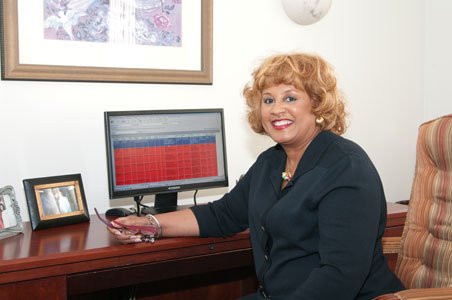BALTIMORE — Success wasn’t simply handed to Jackie Bailey. Like most women entrepreneurs who also happen to be African-American, Bailey had to endure a few doors shutting in her face, overcome higher hurdles than most and display the kind of tenacity that it ultimately takes to run a business that’s now helping to change lives.
“No matter how much planning you do, no matter how diligent, something always comes up,” said Bailey, the founder of P-B Health Home Care Agency, Inc., in Baltimore.
Jackie Bailey (left) was a recipient of The Baltimore Times 25th Anniversary Positive People Award in 2011. Other award recipients that year include: Victoria Wynn (Total Health Care); Martena Wylie-Clinton (Wylie Global Travel); John J. Oliver (Afro American Newspapers); Joy Bramble, publisher of The Baltimore Times; Stanley W. Tucker (Meridian Management Group); and Joseph Whittaker (Morgan State University).
“I am a nurse and I have always wanted to be a nurse growing up in Mississippi as the fifth child in a family of 12,” Bailey said. “When we grew up and I was six or seven years old, we had a health nurse who would come to the home to make sure everyone was doing well. The nurse was black and I was impressed with all the attention she gave us.”
What Bailey said she learned from the home health nurse helped to set the course she’d follow for the rest of her life.
“She said if I wanted to be a nurse, be a professional nurse and be your own boss,” Bailey said.
After Bailey earned her nursing degree in Mississippi, she moved to Baltimore in 1974 and worked briefly at the University of Maryland Hospital’s Intensive Care Unit.
Later, she worked for the Veteran’s Administration Hospital before deciding to pursue opening her own business after noticing a need for the underserved.
Bailey said she and her husband, retired IBM systems engineer Matthew Bailey, who’s also licensed to practice law in Washington, D.C., had to jump through many hurdles to start P-B Health.
Finally, in 1989, the couple opened their business, which provides homebound patients in-home health care services including skilled nursing, physical, occupational and speech therapies, medical social work, and dietary.
“It was something that we noticed that so many individuals needed. It was also something that so many of them didn’t know they were entitled to,” Bailey said. “You’d be surprised how many of them needed this service but didn’t think they could afford it. That’s what happens in certain communities, you’re left in the dark if you don’t know. People may not always tell you that you can have this service. We want them to know that it’s here, we’re here and it’s available.”
P-B Health also has a private-duty division, which supports clients who require assistance with personal care.
“Getting into this business was very difficult. We were supported by many community leaders and church ministries and we were self-financed for the first five years,” Bailey said. She said after the corporation qualified to be a home health agency in 1994, they received a small business operating loan from a bank that was then called Taneytown Bank.
After starting with a staff of just four individuals, P-B Health now has more than 150 employees and recently it was ranked 6th in the Top 50 largest minority-owned businesses in the Baltimore Metropolitan area, according to the Baltimore Business Journal.
And, 20 years after incorporation, Bailey said she’s hoping that her son and daughter-in-law, who is a physician, will one-day take over the business. She said she wants to grow beyond Baltimore but she realizes that to expand, you must be prepared for competition.
“The inner city is the new frontier. At one time there were not too many organizations interested in serving the inner city,” she said. “Now you have everyone realizing the inner city is a great place to be and our vision continues to be to serve those who are elderly, who are disabled, infirmed, post-surgical and others who need us.”

